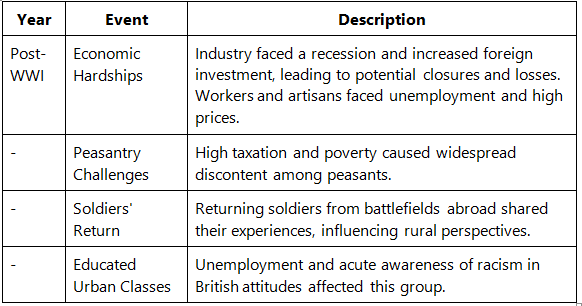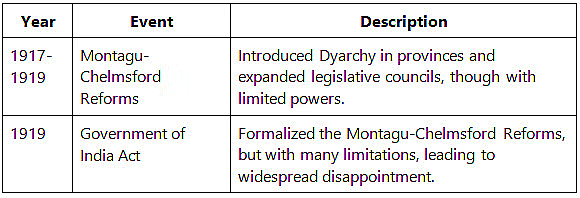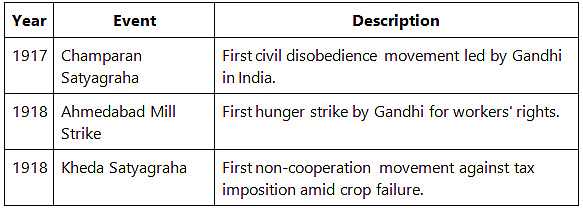Cheat Sheet: Emergence of Gandhi | History for UPSC CSE PDF Download
Nationalist Resurgence and Post-War Economic Hardships
 These hardships contributed significantly to the growing dissatisfaction with British rule and fostered a climate ripe for nationalist resurgence.
These hardships contributed significantly to the growing dissatisfaction with British rule and fostered a climate ripe for nationalist resurgence.
Impact of the Russian Revolution and Worldwide Nationalist Disillusionment with Imperialism

The Russian Revolution had a profound impact on the global anti-imperialist movement, including in India, by promoting ideas of self-determination and equality.
Montagu-Chelmsford Reforms and Government of India Act, 1919

While these reforms were intended to placate nationalist demands, their limited scope and the continuation of repressive measures led to further disillusionment.
Gandhi's Early Career and Experiments with Truth in South Africa

Gandhi's experiences in South Africa were crucial in shaping his methods of peaceful resistance, which he would later apply in India.
Gandhi's Return to India and Early Struggles

These early struggles demonstrated Gandhi's effective use of Satyagraha and his growing influence among the Indian masses.
Rowlatt Act, Satyagraha, and the Jallianwala Bagh Massacre
 The Rowlatt Act and the subsequent Jallianwala Bagh massacre were pivotal in alienating the Indian populace from British rule and galvanizing the independence movement.
The Rowlatt Act and the subsequent Jallianwala Bagh massacre were pivotal in alienating the Indian populace from British rule and galvanizing the independence movement.
The Hunter Committee of Inquiry
 The formation of the Hunter Committee did little to assuage Indian outrage or provide justice for the Jallianwala Bagh massacre, leading to further erosion of trust in British governance.
The formation of the Hunter Committee did little to assuage Indian outrage or provide justice for the Jallianwala Bagh massacre, leading to further erosion of trust in British governance.
This chronology provides a structured overview of the key events and developments during a crucial period in India's struggle against British imperialism, highlighting the emergence of Gandhi as a central figure in the nationalist movement.
|
216 videos|855 docs|219 tests
|
FAQs on Cheat Sheet: Emergence of Gandhi - History for UPSC CSE
| 1. Who was Gandhi and what was his role in the Indian independence movement? |  |
| 2. What were the key principles of Gandhi's philosophy of nonviolence? |  |
| 3. How did Gandhi's approach to leadership differ from other leaders of his time? |  |
| 4. What were the major challenges faced by Gandhi during the Indian independence movement? |  |
| 5. How did Gandhi's principles and strategies influence other civil rights movements around the world? |  |





















